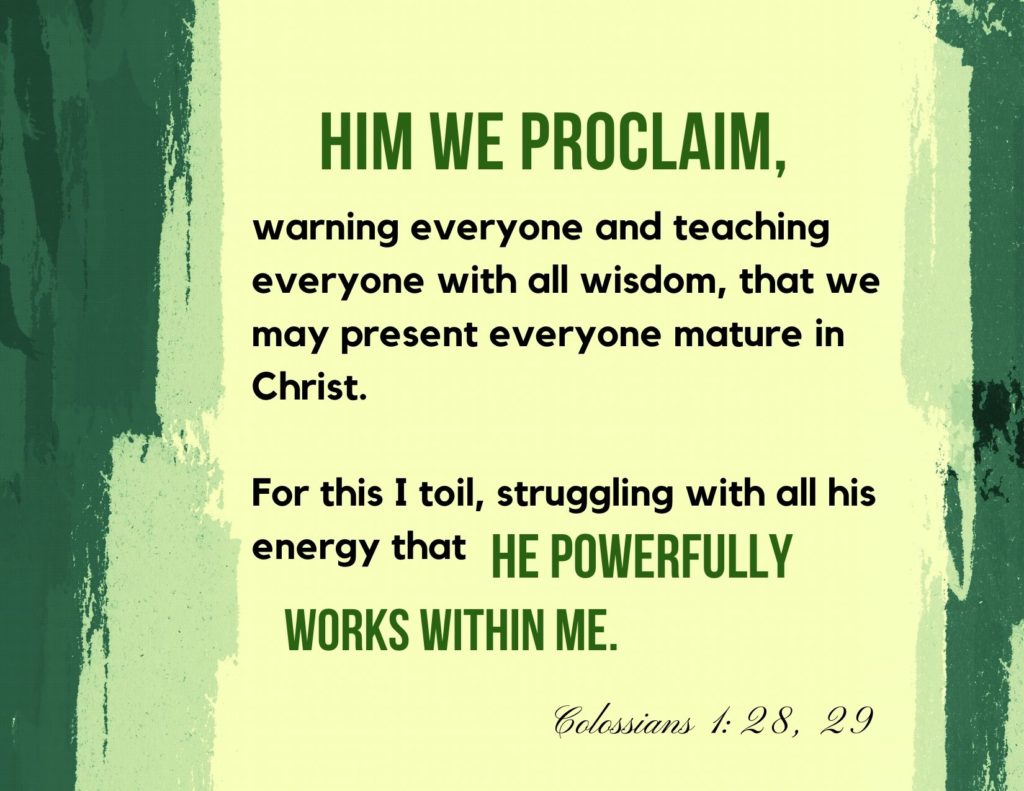….please visit the COVID-19: Devotions page
26
Jan '20

Urgency and Energy: Reflections on the Passage for 2020 ~ by Nicole P.
26
Jan '20

I thought about these verses. I read them over. I tried to break them down, phrase by phrase. I considered what these verses mean to me in this new year 2020. And I came up with two main points.
Dear brothers and sisters, it is my prayer that these two points will be of encouragement to you too!
Him we proclaim, warning everyone and teaching everyone with all wisdom, that we may present everyone mature in Christ. For this I toil, struggling with all his energy that he powerfully works within me – Colossians 1:28, 29
Work with urgency
After I read these couple verses, my mind wandered to the words of Jesus. Right before healing a blind man, Jesus said, “We must work the works of Him who sent me while it is day; night is coming, when no one can work” (John 9:4 ESV). A different translation reads, “I must work the works of Him who sent me while it is day…” (NKJV). “I must work” is an incredible statement of Jesus. He Himself sensed urgency to do His work during His earthly ministry. And He accomplished His work. Then, at the end of His earthly ministry, Jesus entrusted to His disciples a clear assignment: go, make disciples of all nations, baptize them, and teach them to obey all that Jesus commanded (Matt.28:19-20).
We are now the workers of the day time. Now is the day time; now is the time to work. Opportunities for Gospel service will not last forever. So let us work together in the assignment that Jesus entrusted to us. Let us work with urgency! If we become lax now, we may bitterly regret it when night comes. At that time, we may wish to have another chance to work, but it will not be possible.
Pastor Jerome said that he is planning to do Bible studies at a seniors’ home and said that the home’s management will allow it. This is great! But this kind of openness to the Bible may not last for a long time as we see signs in our society of growing opposition to the Gospel message. So let’s work while we can!
Also, we each have been given specific gifts by God to carry out the assignment. These gifts were given to both edify Jesus’ body and share Jesus outside of the body. Dear friends, be faithful stewards of your gift. Don’t think that your gift is insignificant. Don’t covet or compare others’ gifts. Fan into flame your gift! (1 Tim. 1:6)
Work with His energy
Walking before God is not a light matter. And Gospel work is not light work. Apostle Paul acknowledges that in proclaiming Jesus and in warning/teaching everyone, he toils and struggles; yet he does so with the energy that Jesus powerfully works within him. On our own, we also are servants with limited resources, limited health, limited time, limited energy. In every way, we are limited. But the one whom we serve, Jesus, holds inexhaustible supplies of all kinds.
There are many examples from the Scripture, from subsequent history, and even from our personal lives, where limited people accomplished God’s purpose given to them. Or better said, God accomplished His purpose through limited people and in spite of humanly-impossible situations. Some well-known Scripture examples:
- Apostle Paul had a thorn in the flesh (2 Cor. 12:7), but he may arguably be the greatest evangelist of all time.
- Moses was slow of speech and of tongue (Ex. 4:10), but he led the Israelites out of slavery and out of a superpower’s grip.
- Abraham was “as good as dead” and Sarah past child-bearing age (Heb. 11:11-12), yet from Abraham came the promised son Isaac and descendants as numerous as the stars in the sky and the grains of sand on the seashore.
None of us needs to fear that the assignment Jesus gave us will fail. This work will succeed for as long as God allows it to go on. There are times when we may feel like giving up. We may not see immediate fruit. We may face opposition. We may be outright persecuted. We may feel tired and worn. We may have to battle against our own flesh. The enemy may persistently try to discourage and frighten and frustrate God’s work and God’s workers.
But, in Gospel service, there is no toiling which is in vain. Not one prayer is in vain. Not one shed tear is in vain. Yes, some people will reject the Gospel, but others will believe it. Some will oppose the church, but others will join it. At the end, we already know there is victory. And meanwhile, we are able to toil and struggle in fulfilling our assignment because it is Jesus’ energy which powerfully works within us.
Father in heaven, help us to proclaim Jesus. Help us to warn and teach everyone with all wisdom so that everyone will be mature in Christ. Help us to toil and struggle, even if we face opposition. Help us to know that we are not toiling in our own strength, but we struggle with Jesus’ energy that he powerfully works within us. May we hold fast to Jesus in 2020. In Jesus’ name, Amen!
by Nicole P.
[written for the February 2020 church bulletin]
Read more...
29
Dec '19

Rambling Thoughts of a Grateful Pastor
29
Dec '19

Happy New Year Church! I have been wrestling about what to write for the last article of the year. Should I review the past year? Look towards the new year? Summarize the Sermon on the Mount? Introduce the next series of sermons? As I am writing this I still can’t decide. Here then is the fruit of the random thoughts that come to mind as I think about 2019.
I am thankful for God’s faithfulness in 2019. Like Samuel, we can raise our Ebenezer and say, “up to 2020 the Lord has helped us” (1 Sam. 7:12). Year after year I have experienced and can testify that God remains faithful even when we are not (2 Tim. 2:13) and for this I am forever grateful. I am thankful for all of you. You encourage me, you teach me, you shape me, you challenge me, you humble me, you bring me joy, you serve alongside me. Thank you CSBC for your partnership in the Gospel from the first day until now.
I am encouraged to see many of you hungering and thirsting for God’s Word. Like the apostle John I can say that “I have no greater joy than to hear my children are walking in the truth” (3 John 1:4). I am encouraged to see so many of you show up for Sunday school, for Bible Study and prayer meeting, and for our bible study trainings on Sundays. I am encouraged to see how God has answered our prayers and sent more workers to the field. I am encouraged that God has added so many godly saints to our number. I am encouraged that so many of you found strength and boldness to pray and invite friends, colleagues and unsaved family members to Christmas dinner and service.
I am challenged by the cost of following Jesus. If the series on the Sermon on the Mount has taught me one thing it would be that it is not an easy road. Christ demands nothing short of perfection. His followers are called to seek first his kingdom and its righteousness (Matt. 5:3-9, 6:33); judge themselves before judging others (7:1-6); build treasures in heaven (Matt. 6:19-24); fast, pray and give inconspicuously because God does not like a show-off (Matt. 6:1-18); we are called to love our enemies, avoid retaliation, keep our promises, be faithful, and deal with sins from the heart (Matt. 5:17-43). On top of it all, we are to be salt and light in the world even if the outcome is persecution (Matt. 5:11-16). The gate is narrow, the road is narrow (Matt. 7:13) and the cost is high (Matt. 8:18-22, 10:36-38, 14: 25-27, 16:24-26 – read those).
But I am overwhelmed with joy unspeakable and glorious (1 Pet. 1:8) because,
My righteousness is Jesus’ life,My debt was paid by Jesus’ death,My weary load was borne by HimAnd He alone can give me rest.
God makes great demands on us, but he also provides the way and the means to meet them. I am overwhelmed by his patience, his forgiveness, his provision and his strength in my weaknesses. I am overwhelmed by the fact that the high cost of following Jesus is nothing compared with what he has in store for us (2 Cor. 4:17-18).
And finally, I am hopeful that in 2020 God will continue the good work that he has begun among us. I am confident that if we continue to follow Christ, devote ourselves to the Word, pray, and rely on the help of the Holy Spirit, God will accomplish his purposes through us.
I have quoted this before, but it never gets old: in 2020,
Expect great things from God; attempt great things for God– William Carey
Pastor Jerome
Read more...
09
Dec '19

The Meaning of Christmas ~ Video with Kristian Landry
09
Dec '19

What is Christmas about? Christmas is about Christ. The Infinite God became fragile and breakable, a baby, to tenderly win us back to Himself. We want you to have the opportunity to know Him! Watch the video below with a short message by Kristian Landry.
Read more...
29
Nov '19

A Word from the Pastor: Looking Back/Looking Forward
29
Nov '19

Another year is coming to its end. God has been faithful to us and we give thanks to him for his unfailing love and his wonderful deeds for us. In light of our recent 112 anniversary and our future building project, I thought it would be fitting to have a piece of history in our last article. Read more…
Read more...
31
Oct '19

Challenges to Christians Today from Luther’s Reformation ~ by B. Andrew Song
31
Oct '19

Two years ago, Christians across the globe celebrated the quincentenary of the Protestant Reformation. While many cherished its achievements and legacy, others doubted its nature and argued that the Reformation divided the Church and led to endless schisms. How should we think about the Reformation? Since it happened five hundred years ago, what has it to do with me today?
First of all, what is the Reformation? For many, it happened when a German monk nailed his ninety-five theses on the cathedral’s door. With the help of the Guttenberg printing press, Europe was ablaze with a political revolution. However, such a popular view does not fully represent the Reformation. At its core, the sixteenth-century Reformation was a movement of doctrinal and spiritual renewal. In other words, the Reformation did not introduce foreign ideas to Christian faith; instead, the Reformers rediscovered “the faith that was once for all delivered to the saint.” Though the mediaeval period contributed much to the Western civilization, spiritually it was a dark period, as the Roman Church failed to teach the sufficient atonement of Jesus Christ and the authority of the inspired and infallible Word of God. Consequently, many struggled in religious matters: for those who were baptized as children but never experienced conversion, they committed grievous sins in the name of Christ; for those who sincerely believed in Christ’s atonement, they struggled for the lack of assurance; for those who loved the world, they saw the Church as a group of greedy politicians; for those who lost beloved relatives, they feared for the deceased’s spiritual condition. With the threat of the Islamic states in the east, one might wonder: Would the Christian Church have a future?
Centuries before Martin Luther (1483–1546), many pious men and women saw people’s struggles and the Roman Church’s corruption. Instead of seeking better political schemes, they searched the Scriptures. They were thrilled by God’s Words, which were sweeter than honey. For that reason, men like Pierre Vaudès (c. 1140–c. 1205) of France, John Wycliffe (1330–1384), Jan Hus (c. 1369–1415) of Czech, William Tyndale (c. 1494–c. 1536), and Girolamo Savonarola (1452–1498) of Florence began to preach the Bible and make it available for people to read. Like many early Christians, they were slaughtered for their faith. Though the attempts to reform was never ceased, it was not until Martin Luther’ time, where a worldwide Reformation took place. Luther, the Augustinian monk, did not invent the Reformation; instead, he preached the same message of Paul the apostle and the early church fathers.
In a recent study, Professor Johannes Zachhuber pointed out “at the bottom of Luther’s theological position lay a strong and uncompromising affirmation of the absolute centrality of the person of Jesus Christ for the Christian faith.” Thus, the often-well-known slogan of the Reformation theology, “Christ alone” (solus Christus) is the culmination of “Scripture alone” (sola scriptura), “by faith alone” (sola fide), and “by grace alone” (sola gratia). For Luther and the other Reformers, this conclusion did not come to them easily. In the case of Luther, he struggled as many did at his time over the nature of conversion and assurance. The Roman Church taught at the time that unless people could prove their faith, they could not be loved by God. Thus, for Luther and others, God was an angry deity, as it was impossible to repent all sins. It was reported that Luther confessed his sins to his mentor Johann von Staupitz (c. 1460–1524) for six hours! Even so, Luther was not sure if he confessed all he had sinned. It was not until when Luther lectured on Psalms at the University of Wittenberg in 1512 that he learned and experienced the biblical doctrine of justification by faith in Christ alone. When he came to Psalm 71:2––“In your righteousness deliver me and rescue me; incline your ear to me, and save me!” (ESV)––he conducted a study and found Romans 1:16–17, where Paul wrote, “the righteous shall live by faith.” God spoke to Luther’s troubled heart by his own Words! God’s righteousness was a gift freely given to those who love God in Christ. As sinners, we can never please God by our own merits. Unless we see our inability and Christ’s full love and righteousness, we are Christians by name only, and we are worse than the Pharisees. We are like the disciples, who, though they were fishermen, still struggled much in the storm. Only by crying out to the Lord Jesus, the incarnated God, the suffered servant-King, we can be saved and restored. That is what grace is about, as the Reformers proclaimed:
We deserve but grief and shame,
Yet His words, rich grace revealing, Pardon, peace, and life proclaim; Here our ills have perfect healing. Firmly in these words believe: Jesus sinners doth receive.
(Erdmann Neumeister, Jesus nimmt die Sünder an [1653])
Here are two challenges for you.
First, don’t just believe, know what you believe. We challenge you to dive deeper into the Scripture by not only reading it, but also by studying, memorizing, meditating, and praying the Word of God. We need to experience Christ with his Words. Remember these words from Luther: “the highest of all God’s commands is this, that we should hold up before our eyes the image of his dear son, our Lord Jesus Christ. Every day he should be our excellent mirror wherein we behold how much God loves us and how well, in his infinite goodness, he has cared for us in that he gave his dear Son for us.”
Second, we challenge you to continue to love your neighbours by praying for fellow-sinners’ conversion. We need to look beyond the walls of our homes and church. Remember your Christian brothers and sisters everywhere! Pray that the gospel of grace may be made known to every person. Pray that your own life may bear a faithful witness to the Lord in every circumstance, and many may wonder and “ask you for a reason for the hope that is in you” (1 Pet 3:15).
[Written as a bulletin insert for Christie St. Baptist Church, Toronto, ON in October 2019.]
Read more...
27
Oct '19

Notes on Unforgiveness
27
Oct '19

“Unforgiveness is like poison that you drink hoping that it harms the other person.” I’ve heard that many times. Yet, I drank the poison. It consumed me, sapped my energy, and gave me dark circles under my eyes. After months of such miserable living, circumstances converged and I had to decide whether I would forgive. It was time to decide.
I prayed. A few days later, I jotted on a piece of paper some points which had been circulating in my mind and which were the most significant to me. These points are not exhaustive, but they are what God impressed on me most. I hope they will be of use to you, dear reader, if you are also struggling with the poison of unforgiveness:
1. FORGIVE SO THAT YOU MAY BE HEALED & RESTORED
In my case, the first step toward my healing was forgiveness. And that first step depended on me. I was reminded that, in the last chapter of Job, God directed Job’s three friends to go to Job so that he may pray for them. But God had yet restored nothing to Job. Job was still in pain and poverty when he prayed for the friends who had accused him with harsh and mis-applied words, words of condemnation and guilt. I believe that Job had to forgive his friends before he could sincerely pray for them. Then, “[a]fter Job had prayed for his friends, the Lord restored his fortunes and gave him twice as much as he had before.” (Job 42:10 NIV)
Dear friend, God may also be asking you to do this very hard thing, almost seemingly unfair – to forgive and pray for those who hurt you even though your circumstances remain unchanged at the moment. Even though you are right and the wrong-doer is wrong. Even though you may have some questions yet unanswered by God.
Even so: forgive! Do not hinder the way to healing!
2. FORGIVE SO THAT YOU MAY BE RELEASED FROM TORMENTORS
Through the parable of the unmerciful servant (Matthew 18:21-35), I understood that the unforgiving are given over to tormentors (Matthew 18:34, 35). And I realized how true this had been for me.
Unforgiveness gave way to deep emotional and mental torment as I continually dwelt on the shortcomings of the one who had hurt me. I could not be free of this person in my mind. Anger and bitterness would surge inside of me almost on cue when I would think of them (which was often). I fell behind in my work because my thoughts could not focus on the task at hand but were so consumed with the person. Then I also had physical torment: aches in the joints, sleepless nights, and depleted energy.
3. FORGIVE SO THAT YOU DON’T SCORN GOD
God has forgiven me and paid the ultimate debt for me. No person on this earth can hurt me as much as my pride and rebellion hurt God. Withholding my forgiveness from other people scorns the gift of forgiveness that I so willingly receive from God. It shows disdain toward God. And it is utterly self-centred to eagerly receive God’s forgiveness, yet failing to grant it to others.
4. FORGIVE EVEN IF TRUST IS NOT YET RESTORED
To love and forgive others are commands. To trust others is not an absolute command. In close church relationships – as in my situation – trust may be rebuilt over time. But regardless of broken trust, forgiveness can be granted.
When I realized that forgiveness and trust are separate matters, it freed me to forgive. I condemned myself because I was disillusioned with the person and doubtful of all their intentions/words/actions and my fellowship with them was hindered. These feelings indicated broken relational trust. But as far as my bitterness against this person – I chose to let go and to forgive.
And this leads to the final point…
5. FORGIVE OUT OF YOUR WILL, NOT YOUR EMOTIONS
I did not feel like forgiving. I felt that I would be justifying their behaviour. I felt that I was letting them off the hook. I felt that they did not even genuinely acknowledge the turmoil they caused me. I felt… I felt… But by an intentional act of my will, not my emotions, I chose to forgive.
Dear reader, I encourage you to forgive! Oh, it may feel impossible to do so. Maybe you have suffered wrongs which are detestable and painful! Maybe the wrongs of others have caused you significant adversity in life, or cost you opportunities, or caused you deep sorrow… And perhaps you are still suffering in the consequences of wrongs committed against you. I encourage you to ask God to give you the power to forgive. Bring your hurt before God and seek His help.
Say good-bye to unforgiveness and make room for healing and blessing and freedom and joy!
May it be so, Lord Jesus. Help us to forgive!
Read more...
13
Oct '19

The Lord is Close to the Brokenhearted
13
Oct '19

The Lord is close to the brokenhearted
and saves those who are crushed in spirit.
The righteous person may have many troubles,
but the Lord delivers him from them all; he protects all his bones,
not one of them will be broken. Read more…
Read more...